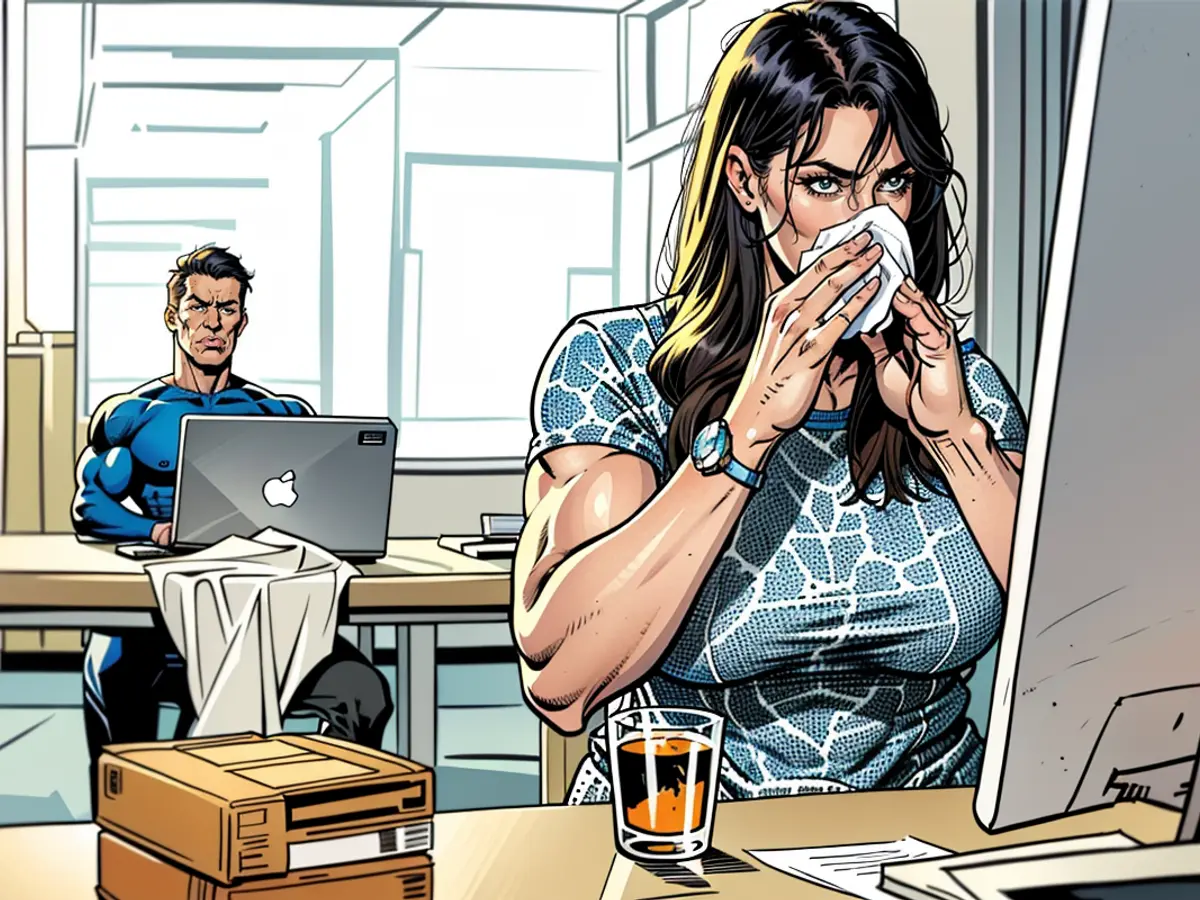- The Role of Falsified Bravery in Aggravating a Chilly Condition
Approximately 2.8 million individuals are currently dealing with a severe respiratory illness, characterized by symptoms like sneezing, coughing, throat irritation, occasional fever, fatigue, headache, and body aches. The summer of 2024 is known for its strong cold front.
The good news: As per the latest weekly report from the Robert Koch Institute (RKI), the wave appears to be subsiding. The number of new cases has decreased from 3,900 cases per 100,000 inhabitants last week to the current 3,300 cases. The number of doctor visits by parents with children under four years old has also declined. Given that young children often bring infectious agents from kindergarten and spread them among siblings and parents, this decrease is an encouraging sign. The current summer colds are mainly caused by rhinoviruses and SARS-CoV-2. Influenza viruses play a minimal role in the infection process.
The Problem of "Presenteeism"
Colds are a common illness, affecting adults twice to four times a year. Yet, we have a hard time accepting them. That nagging cough shouldn't interrupt our daily routines.
Experts refer to this as "presenteeism" when people attend work while ill. Maren Beer from the Institute for Occupational Health Consulting (IFBG) and Techniker Krankenkasse researched this trend in 2022. "The numbers don't lie," says Beer. "58 percent of the 1,200 surveyed confessed to regularly attending work when sick." Over 40 percent stated they would do so even with a severe sore throat, cold, or cough.
The reasons behind this are commendable – they don't want to miss important appointments, don't wish to burden their colleagues, and delight in their work so much that they shun time off. It's often the highly motivated, hard-working individuals who drag themselves to work when sick, says Beer.
They're not doing themselves or their employers any favors. "Presenteeism costs more than absenteeism, where employees call in sick when they're not actually ill," says Beer. Neglecting an illness can lead to its chronicity, resulting in longer absences, and productivity and performance can decrease.
Risks of Disregarding Colds
Disregarding a cold can result in prolonged inflammation in the nasal passages or bronchi, and in rare cases, pneumonia. Young men who engage in vigorous exercise immediately after an infection have an increased risk of heart inflammation.
Interestingly, individuals who work from home are more likely to practice presenteeism than those who commute to the office. "The 'bedside decision' is a factor," says Maren Beer. "You wake up feeling unwell in the morning and ponder if you can work or if you're too sick. In a home office, this decision can be revised at any time. The threshold for simply moving to another room to work or opening your laptop in bed is lower than commuting to the office."
Whether cold waves would be shorter if the evil of presenteeism were eradicated – no one can say for certain.
Allow Your Immune System to Shine
We know this: "A typical cold lasts five to ten days, rarely more than 14 days," says Dr. Uwe Popert, spokesperson for the German Society of General Medicine and Family Medicine (DEGAM). Factors that weaken the immune system make individuals more susceptible to colds: chronic stress, sleep deprivation, exposure to cold, illness.
Resting consistently during the first two days after symptom onset aids the immune system in its fight against the virus. If things progress well, symptoms should subside within three to seven days, and completely disappear within 14 days.
Despite the decrease in new cases and doctor visits due to the subsiding wave of respiratory illness, it's important to note that disregarding a cold can lead to complications. In rare cases, young men who engage in vigorous exercise immediately after an infection have an increased risk of heart inflammation, specifically inflammation of the heart muscle.







